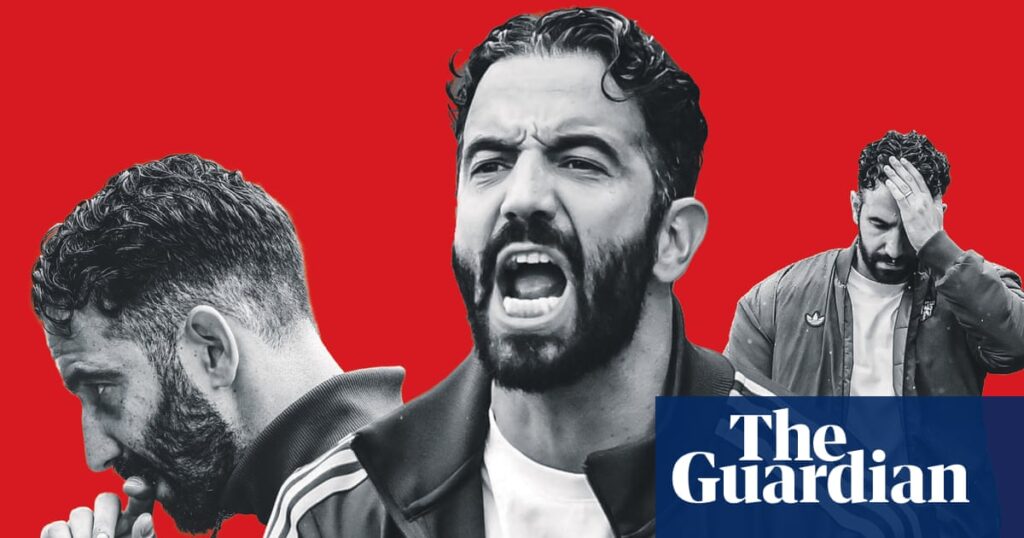Soap opera, wall-to‑wall media coverage, a sporting Truman Show and real-life panopticon. Ruben Amorim, like those before him, blinks in the glare of the endless fascination with Manchester United’s leading man, and may wonder whether this is the impossible job.
Three games into a first full campaign the 40-year-old seemed to believe so. The desultory 12-11 Carabao Cup penalty shootout defeat at Grimsby followed a 1-0 loss to Arsenal and 1-1 draw at Fulham. Three matches, zero wins, and the executioner’s song began to wail for the Portuguese’s job security.
Especially when he said of the Grimsby result: “This is a little bit the limit. Something has to change. At this moment, we need to focus on the weekend and then we have time to think.” Then, the bombshell: “I felt my players spoke really loud today about what they want.”
Reporters tapped up contacts, the pundit class speculated, United enthusiasts debated over pints and social media. Was Amorim suggesting his side “wanted” a new head coach? And did “we have time to think” after the weekend Premier League visit of Burnley (which United won 3-2) mean he could walk?
A first United defeat by League Two opposition in the second‑tier cup competition will always be a big deal. But zoom out a smidgeon and the wider picture in the bread and butter of the league was two matches played and a point taken (not great but also no seismic disaster) and United motor across town for Sunday’s 197th derby with four points, one more than Pep Guardiola’s garlanded Manchester City, who are winless since the opening day.
So is it reasonable to consider Amorim’s position under threat three games into a season? Certifiably not. Is this simply life for the gent in the hottest of football seats? Certainly.
On one level the focus on Amorim is ridiculous – quasi-farcical. On another it is manna from heaven for Sir Jim Ratcliffe and the Glazers, owners who are conscious the constant eyeballs on their manager is a massive feeder of the United cash machine. When Ed Woodward said in December 2013 the club could go trophyless and still “sell an incredible number of shirts” he voiced the prevailing commercial truth about this global behemoth.
Fans and others who might term themselves football purists seized on the then executive vice‑chair’s comment as entitled, anti‑sport. Yet what it pointed to was United’s status as an institution of fascination akin to the British royal family and what it means for the bottom line: lucrative commercial deals and riches. However uncomfortable or exaggerated, the relentless spotlight translates into millions in revenues. In July 2014 an Amorim predecessor, Louis van Gaal, used his unveiling to say: “This club is guided in a commercial way and it is not always possible to meet commercial and football expectations.”
Amorim, like Van Gaal, had to walk into the place to realise the scale of the job. Only Real Madrid are analogous as a club where the head coach is public property, his results not ranking as far ahead of matters such as off-field tittle-tattle and gossip, social media reaction and press releases trumpeting the latest sponsor as they should. This is the deal, and Amorim walked in with eyes open. But as David Moyes, Van Gaal, José Mourinho, Ole Gunnar Solskjær and Erik ten Hag found, in the post-Sir Alex Ferguson era, nothing can prepare for the realpolitik of piloting the club. Statesman, media performer, fan favourite, club cheerleader, players’ guru and, yes, the man who must win every game via an XI embodying the United way of “attack, attack, attack”.
It is clear why the role is attractive. A sizeable paycheque (Amorim earns a cool £9m a year); the CV-burnishing status of being the club’s choice; and the sporting challenge: be the one who gets this right and wins a 21st top-division title, and the first since Ferguson’s in 2013, and immortality is yours.
But pulling the feat off is like an nth-degree Rubik’s Cube. Amorim is always being observed, analysed, dissected, judged – however significant or innocuous an act. Or, like the philosopher Jeremy Bentham’s panopticon, it feels as if he is – which is the same thing.
after newsletter promotion
After the Grimsby defeat, this correspondent was informed of a feeling at the club that Amorim could walk away owing to an emotional temperament. He remains in situ but how long before the inquests into his position start up again? Possibly about five minutes after the end of Sunday’s encounter if United lose.
In The Truman Show, Truman Burbank unknowingly lives in a world that is a reality TV series. With his every move entertainment, he is dehumanised, a dollar sign only. Burbank’s catchphrase is: “In case I don’t see ya, good afternoon, good evening, and good night.” This may be Amorim’s fate too.
A view may be, who cares? Amorim is a big boy. The point here is the sport: the task of returning the club to the top. He has to win while taming the hydra-headed monster that is United and this is not possible in the short term. So while he shares culpability in overseeing a £200m summer spend that came up short of an elite goalkeeper or No 6, Amorim should be able to make missteps such as the defeats against Grimsby and Arsenal and the draw at Fulham and not face end-of-times hysteria.
The rebuild Amorim undertakes is bound to be messy at times because of the mess he inherited.

